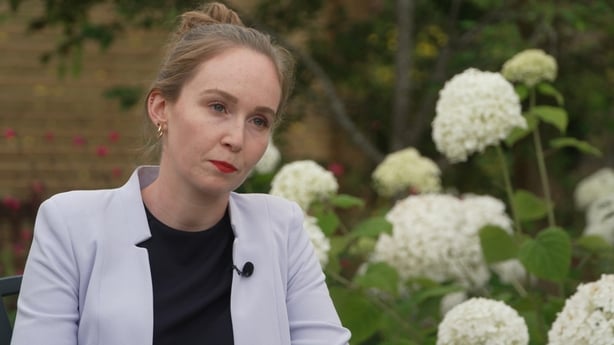A new drug, that has been found to slow the progression of Alzheimer's, offers a "ray of hope" to sufferers of the disease according to Alzheimer’s advocate Helen Rochford-Brennan.
A study published in the Journal of the American Medical Association says that donanemab slows "clinical decline" by up to a third, allowing people with the disease to perform day-to-day tasks including shopping, enjoying a hobby and taking medication.
Ms Rochford-Brennan, who was diagnosed with the disease in 2012, says that while the drug is not a cure, she is optimistic about the effect it could have on the treatment of Alzheimer's.
"I'm optimistic for all of the people that can be able to use this drug. It's not going to help me or people that are diagnosed for a long time. But what it is going to mean is that we want more people diagnosed early," Ms Rochford-Brennan told Miriam O’Callaghan on Prime Time.
The Alzheimer's Society said that treatments like donanemab could one day mean the condition could be likened to other long-term ailments such as asthma or diabetes.
"This drug is a game changer. It is a leap because for 20 years, there was no new treatment for Alzheimer's disease," Dr Laura O’Philbin, Research and Policy Manager at the Alzheimer Society of Ireland told Prime Time.

"I think it's a great moment for people with Alzheimer's, a great moment for families," Ms Brennan-Rochford said.
Donanemab, which is developed by Eli Lilly, is an antibody medicine that helps in the early stages of the disease by clearing a protein that builds up in the brains of people with this type of dementia.
Researchers examined 1,736 people with early-stage Alzheimer's over 18 months as part of the ground-breaking trial. The volunteers were aged 60 to 85.
Half of them received a monthly infusion of donanemab and the other half were given a placebo.
The pace of the cognitive decline was slowed by about 20-30% overall - and by 30-40% in a set of patients who researchers thought more likely to respond.
Researchers said that the drug works best if Alzheimer's patients are treated as early as possible, ideally before they develop symptoms.
Results were less successful for older, later-stage patients as well as those with higher levels of a protein called tau that has been linked to Alzheimer's disease progression.
"The treatment effect isn't vast. It only slows it down a little bit. But if you think about the first drug that we had for HIV, that was far from ideal, and now we have amazing treatment options for HIV. This is a first-generation drug and we are hopeful that, scientifically, we can build on this so it can have huge clinical impact in the future," Dr O’Philbin said.
There are currently an estimated 64,000 people with dementia in Ireland, and by 2045, that number is anticipated to increase to 150,000, according to the HSE.
The breakthrough follows the recent development of Eisai and Biogen’s lecanemab which was also proven to slow the disease.
While the results have been widely welcomed, donanemab is not without its risks.
Brain swelling affected up to a third of patients in the donanemab trial with the deaths of three volunteers linked to the treatment.
And while the breakthrough has been welcomed by the medical community, it is not a simple treatment to administer.
Donanemab is a once-a-month treatment administered intravenously and anyone receiving treatment will have to be monitored with regular MRI scans.
"We don't have enough MRI scanners because being able to look across an 18-month period of taking this drug, a person might need to have four or five MRI scans and we just don't have the resources to be able to deliver that," Dr O'Philbin said.
In a statement to Prime Time the HSE said: "It was committed to the development of services for the prevention and treatment of dementia," and added that "it will remain up to date with new developments in relation to disease-modifying treatments to examine how existing and future services could support treatment of patients."
